
A grassroots scholar
As a curious manager of teams that challenged one another with tough questions around ethics and complex problems, I was inspired to develop rigorous reflection and research capacities within the organizations I led. My work as a practitioner has required me to foster my skill-set as a scholar oriented toward the creation of the kind of resources I desire: practical tools backed by thoughtful analysis, co-created, and ground-truthed with critical stakeholders. My ethic is one that acknowledges and affirms many simultaneously existing paradigms, or worlds, and is not troubled by their potential incommensurabilities. My approach interweaves research and practice, hand in hand. I believe practical implementation advances theory. My praxis is rooted in the importance of historical analysis to uncover accountabilities in combination with expanding the bounds of creativity with speculative imagination of possible futures.
My research methodology is a unique combination of Grounded Theory, Co-Creation, Open Research, and Strategy.
Grounded Theory
Grounded theory is a research tool which enables one to seek out and conceptualize the latent social patterns and structures within an area of interest. It's rigorous but it's not fussy, and has a strong emphasis on creating theories from patterns for the sake of practical application.

Co-Creation
I've found that when you combine Grounded Theory with co-creation processes, the resulting effect is powerful. Co-creation invites stakeholders to participate in a design process to produce a mutually valued outcome. Co-creation generates more innovative and high-performing designs. At the heart of this phenomenon is a mathematical truism: when a sufficiently large and diverse group of people is asked to make independent predictions or assessments, the errors each makes in coming up with an answer cancel each other out, providing the most accurate information.
I apply co-creation to research by involving groups of stakeholders with particular content and lived-experience expertise in identifying and making sense of latent patterns together, in order to develop theory and prototypes for application.
Open Research
I believe co-creative research processes are most effective when they are rooted in the ethos of open research. Open research encourages researchers to share emerging information and knowledge with the public as early as it is practical in an inquiry. This not only enables others to see a window into the process for their own deeper learning, but also encourages re-mixing and adaptation on the part of others in ways that accelerate possibilities.

Strategist lens
I approach research and praxis as a strategist, assessing the most critical insights and tools that are of service to a theory of change rooted in a Just Transition. This also means I am not an impartial researcher. I am guided by a strong set of values underpinned by a reparative and regenerative justice agenda. I am researching to find pathways into a more just future and an economy that works for all.
